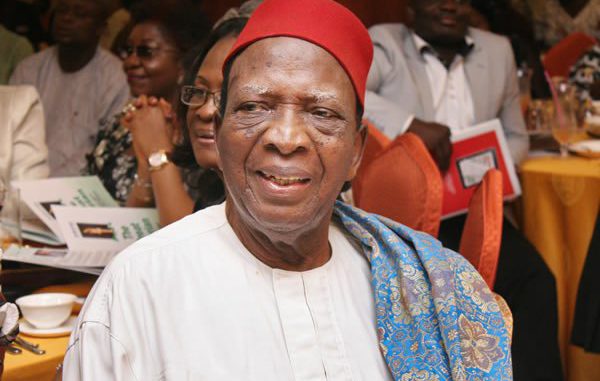
The Group of Southern Leaders of Thought, an association of elder statesmen, have said a negotiated restructuring, implemented through a new Constitution, is the best assurance for the realisation of one Nigeria.
At a press conference in Lagos, Thursday, the group, led by Professor of Law, Ben Nwabueze, said although a majority of Nigerians are committed to the indivisibility of the country, they need to be given an opportunity to negotiate the conditions.
“In our circumstances as a country, with a vast expanse of territory, comprising a great diversity of ethnic nationalities, with divergent interests and outlooks, it seems generally agreed that a federal system, truly so-called, is the system appropriate to our situation,” the group said in a joint statement at the end of their meeting.
“We therefore conceive restructuring as requiring, modified as necessary, the restoration or re-establishment of the kind of federalism that existed under our 1960/1963 Constitutions. That is the central object or purpose of restructuring.
‘In more explicit words, the essential purpose of restructuring is to enable the component ethnic nationalities, grouped together by affinity of culture/language or territorial contiguity, to govern themselves in matters of internal concern, leaving matters of common concern, not overwhelmingly extensive in their range, to be managed under a central government constituted in such manner as to ensure that it is not dominated by any one group or a combination of them.
“And above all, to ensure justice, fairness and equity to all in the management of matters of common concern. It assures an optimal measure of self-determination or self-government consistent with the territorial sovereignty of the country.”
Members of the group include Emeka Anyaoku; Ayo Adebayo; Kimse Okooko; Alani Akinrinade; Ndubuisi Kanu; Ike Nwachukwu; and Donald Duke.
Others are Victor Attah; Gbenga Daniel; Solomon Asemota; Kalu Idika Kalu and Pat Utomi.
On the issue of self-determination, the group noted that it does not connote independent government, but the right of each group, within the territorial sovereignty of the country as one state, to govern itself in matters that concern it alone.
“As, for example, local government matters which is an example par excellence of a matter of local concern (local government in a village in Hausa land should not be the business of an Igbo man); the election of elective public functionaries in a Region or Zone – governors and members of legislative assemblies and local government councils; etc.
“The term ‘self-government’ expresses the essence of restructuring in our understanding of it.
“To reiterate, self-government requires that the ethnic nationalities, grouped together by reference to culture/language and geographical contiguity, should be enabled to govern themselves in matters that concern them alone, within the sovereignty of a central government common to all, with powers appropriately circumscribed.”
The group stated that among the factors that impair the objective of true federalism in Nigeria, the most crushing is the over-concentration of political power and financial resources in the federal government “far far beyond what they were under the 1960/63 Constitutions.”
“The result of the accretions of power to the centre, either by direct grant by the constitution or by perverse interpretation of its provisions, is to alter the power relations between it (the centre) and the states so significantly as to change the character of the system quite substantially from a federal to a unitary system,” the group continued.
“The system remains federal largely in name. Re-visiting the Exclusive and Concurrent Legislative Lists under the 1963 Constitution, we think that the powers of the federal government thereunder should be further reduced in the several respects, indicated in our Position Paper.
“The over-concentration of financial resources and relations in the federal government affronts true federalism in no less a grievous degree.
“An arrangement whereby every month officials of the state governments, including quite often the state governor himself, go, cap-in-hand, as it were, to Abuja for their share of the money in the federation account disbursed or paid out to them by officials of the federal government as paymaster is a negation of true federalism; it simply caricatures true federalism.”
The group maintained that restructuring cannot be implemented by constitution amendment, noting that a new constitution should be adopted by the people at a referendum to be led by the president or an elected leader.
“It is sad that, while a clamour for restructuring is reaching a crescendo and is sweeping across the country, the National Assembly is still regaling us with talks about constitution amendment, and is buttressing its position by the erroneous assertion that the 1999 Constitution can only be amended or altered (sections 8 and 9), but cannot be abolished and replaced by a new constitution.
“By taking this untenable position, the National Assembly makes itself a big obstacle in the way of restructuring.
“The view that the 1999 Constitution can only be amended or altered but cannot be completely abolished and replaced by a new constitution is erroneous because it fails to take account of the fact that the 1999 Constitution is only a Schedule to a Decree, Decree 24 of 1999.
“That Decree is an existing law under Section 315 of the 1999 Constitution and, like all existing laws within federal competence, can be repealed by the National Assembly. Upon the repeal of the Decree, the 1999 Constitution completely disappears from existence.”
The rest of the members of the group are Elliot Ugochukwu-Ukoh; Tony Killa; Harry Akande; Promise Adewusi; Sola Ehindero; Akin Oyebode; Adewale Adeoye; Chigozie Ubani; and Olawale Okunniyi.
END

Be the first to comment